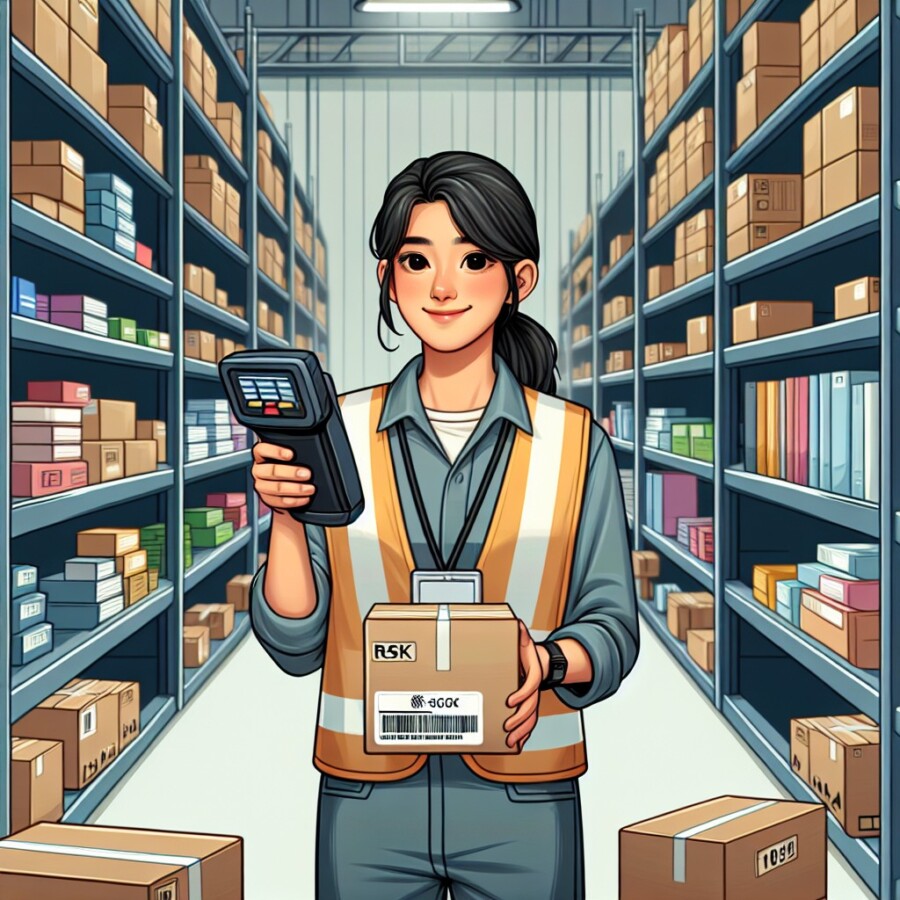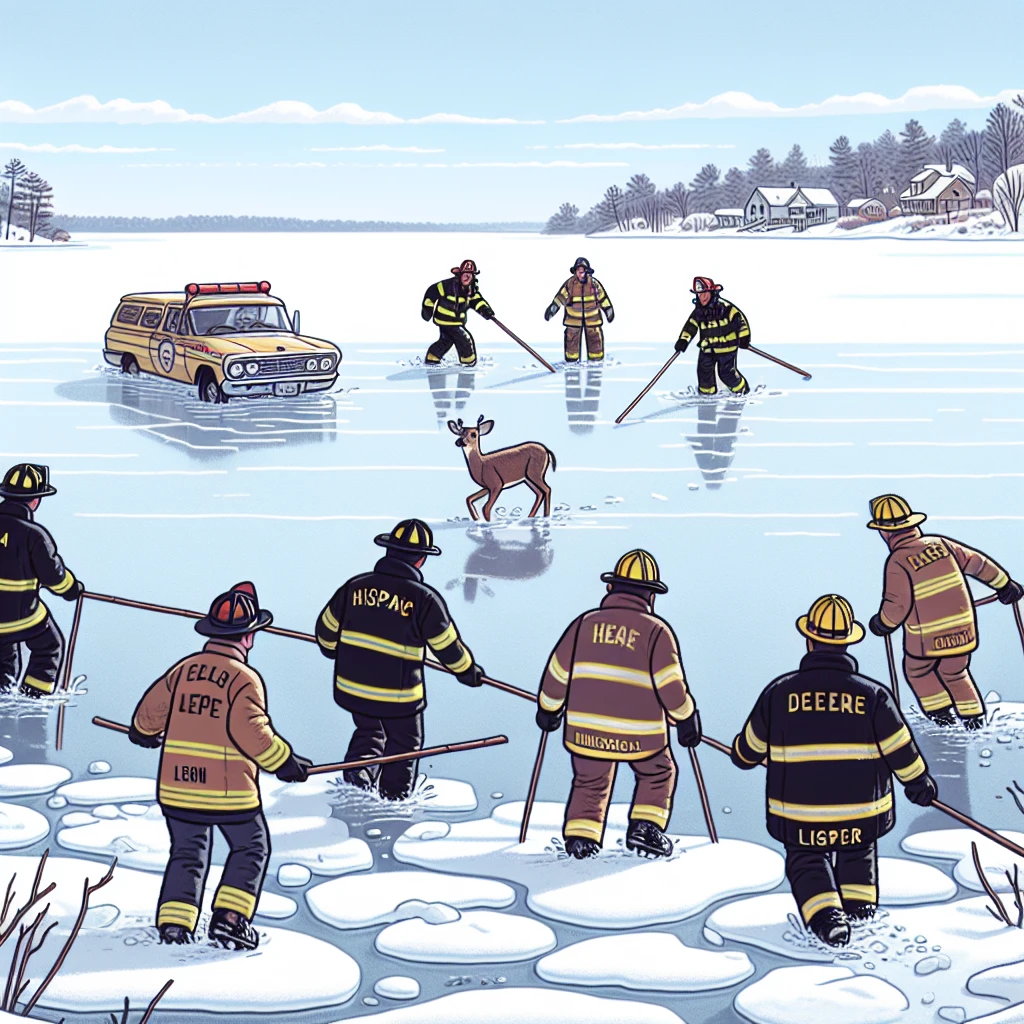Amazon has been fined €32m (£27m) in France for spying too much on its workers. The French data protection agency, called CNIL, found that Amazon was recording data from workers’ handheld scanners in a way that was against the law. The investigation started because workers complained and the media talked about bad working conditions. The CNIL found several breaches of the General Data Protection Regulation (GDPR), including using a system with three alerts to watch what workers were doing, which was ruled to be illegal. Amazon disagrees with the decision and plans to appeal.
The CNIL also questioned why Amazon kept workers’ data for 31 days. The watchdog found that Amazon was tracking workers so closely that they might have to explain every break they took. Amazon used the data from the scanners to plan work, evaluate workers, and give training. But the CNIL said Amazon didn’t need to know all the little details of the data for these things. The watchdog also criticized Amazon for not telling workers and visitors about the spying and for not having enough security on its video surveillance.
This isn’t the first time people have been worried about Amazon spying on workers. In the UK, a similar system for watching how much work employees did was talked about. Amazon’s Europe policy chief, Brian Palmer, said workers could be fired if they got three warnings on the system. But later, Amazon said Palmer’s statement wasn’t completely true. A report by the Business, Energy and Industrial Strategy Committee also raised concerns about using spying technology to set targets and watch workers, saying it could make people not trust their bosses and feel like they were being watched too closely.
The GMB union, which represents Amazon workers in the UK, said the fine showed that Amazon’s staff were being watched too much. The CNIL’s decision is a reminder that it’s important to protect workers’ privacy and make sure spying follows the rules. It also tells companies they need to be open and responsible when they use spying technology.
Original news source: Amazon fined for ‘excessive’ surveillance of workers (BBC)
🎧 Listen:
Slow
Normal
Fast
📖 Vocabulary:
| 1 | fined | Made to pay money as a punishment for breaking a rule or law |
| 2 | spying | Secretly watching someone’s actions |
| 3 | breaches | Acts of breaking or not following rules |
| 4 | handheld | Small enough to be held and used in one hand |
| 5 | illegal | Not allowed by the law |
| 6 | appeal | To formally disagree with a decision and try to change it |
| 7 | tracking | Following and recording someone’s or something’s movements |
| 8 | evaluate | To judge the value or condition of someone or something |
| 9 | surveillance | Being watched, especially by cameras |
| 10 | criticized | Spoken or written disapproval of something |
| 11 | policy | A set of ideas or a plan of what to do in particular situations that has been agreed to officially by a group of people |
| 12 | fired | To lose your job because someone in authority has decided you did something wrong |
| 13 | concerns | Worries or doubts about something that might be problematic |
| 14 | technology | The use of scientific knowledge or tools to perform tasks more efficiently |
| 15 | responsible | Having the job or duty of dealing with or taking care of something or someone |
Group or Classroom Activities
Warm-up Activities:
– News Summary
Instructions: In pairs, students will read the article and then summarize the main points in their own words. They should focus on the key information and important details. Afterward, they can compare their summaries with a partner and discuss any differences.
– Opinion Poll
Instructions: In small groups, students will discuss their opinions on the topic of workplace surveillance and Amazon’s actions. They should take turns sharing their thoughts and reasons behind their opinions. Then, they can conduct a poll within their group to see how many people agree or disagree with each opinion. Finally, they can present their findings to the class.
– Vocabulary Pictionary
Instructions: In pairs or small groups, students will select 5-10 vocabulary words from the article. They will take turns drawing pictures to represent each word while their partner(s) guess the word. They should try to use context clues from the article to help them guess the correct word.
– Pros and Cons
Instructions: In pairs or small groups, students will create a list of the pros and cons of workplace surveillance. They can use the article as a starting point for their discussion, but should also consider their own experiences and opinions. Afterward, they can share their lists and discuss their reasoning with the class.
– Future Predictions
Instructions: In pairs or small groups, students will discuss and make predictions about the future of workplace surveillance. They should consider how advancements in technology and changing attitudes towards privacy may impact the use of surveillance in the workplace. They can share their predictions with the class and engage in a class discussion about the topic.
🤔 Comprehension Questions:
1. Why did Amazon receive a fine in France?
2. What did the French data protection agency find Amazon guilty of?
3. How did the investigation into Amazon’s actions start?
4. What breaches of the General Data Protection Regulation did the CNIL find?
5. Why did the CNIL criticize Amazon for keeping workers’ data for 31 days?
6. What did Amazon use the data from the scanners for?
7. Why did the CNIL criticize Amazon for not telling workers and visitors about the spying?
8. What concerns have been raised about Amazon spying on workers in the UK?
Go to answers ⇩
🎧✍️ Listen and Fill in the Gaps:
Amazon has been fined €32m (£27m) in France for spying too much on its (1)______. The French data protection agency, called CNIL, found that Amazon was recording data from workers’ (2)______ scanners in a way that was against the law. The (3)______ started because workers (4)______ and the media talked about bad working conditions. The CNIL found several breaches of the General Data Protection Regulation (GDPR), including using a system with three alerts to watch what workers were doing, which was ruled to be illegal. Amazon (5)______ with the decision and plans to appeal.
The CNIL also questioned why Amazon kept workers’ data for 31 days. The watchdog (6)______ that Amazon was (7)______ workers so closely that they might have to explain every break they took. Amazon used the data from the scanners to plan work, evaluate workers, and give training. But the CNIL said Amazon didn’t need to know all the little details of the data for these (8)______. The watchdog also criticized Amazon for not telling workers and visitors about the spying and for not having enough security on its video surveillance.
This isn’t the (9)______ time people have been worried about Amazon spying on workers. In the UK, a similar system for (10)______ how much work (11)______ did was talked about. Amazon’s Europe policy chief, Brian Palmer, said workers could be fired if they got three warnings on the system. But later, Amazon said Palmer’s statement wasn’t completely true. A report by the Business, Energy and Industrial Strategy Committee also (12)______ concerns about using (13)______ technology to set targets and watch workers, saying it could make people not trust their bosses and feel like they were being (14)______ too closely.
The GMB union, which represents (15)______ workers in the UK, said the fine showed that Amazon’s staff were being watched too much. The CNIL’s decision is a reminder that it’s important to (16)______ workers’ privacy and make sure spying follows the rules. It also tells companies they need to be open and responsible when they use spying technology.
Go to answers ⇩
💬 Discussion Questions:
Students can ask a partner these questions, or discuss them as a group.
1. What is the General Data Protection Regulation (GDPR) and why is it important?
2. How would you feel if your employer recorded data from your handheld scanner without your knowledge?
3. Do you think it is fair for Amazon to track workers so closely that they have to explain every break they take? Why or why not?
4. What do you think about Amazon using data from scanners to evaluate workers and give training? Is it a good idea or not? Why?
5. How do you think workers and visitors would feel if they found out they were being spied on without their knowledge?
6. Do you think it is necessary for Amazon to keep workers’ data for 31 days? Why or why not?
7. What are some potential negative consequences of using spying technology to set targets and watch workers?
8. How do you think workers’ privacy can be protected in the workplace?
9. Do you think it is important for companies to be open and responsible when using spying technology? Why or why not?
10. Have you ever experienced a situation where you felt like you were being watched too closely at work or school? Can you share your experience?
11. How would you react if your employer implemented a similar system for watching how much work you do? Would you be worried or not? Why?
12. What measures do you think companies should take to ensure the security of video surveillance?
13. What do you think about the GMB union’s statement that Amazon’s staff is being watched too much? Do you agree or disagree? Why?
14. How can trust between employees and their bosses be affected when spying technology is used in the workplace?
15. Do you think fines are an effective way to prevent companies from spying on their workers? Why or why not?
Individual Activities
📖💭 Vocabulary Meanings:
Match each word to its meaning.
Words:
1. fined
2. spying
3. breaches
4. handheld
5. illegal
6. appeal
7. tracking
8. evaluate
9. surveillance
10. criticized
11. policy
12. fired
13. concerns
14. technology
15. responsible
Meanings:
(A) To lose your job because someone in authority has decided you did something wrong
(B) To formally disagree with a decision and try to change it
(C) Secretly watching someone’s actions
(D) Small enough to be held and used in one hand
(E) A set of ideas or a plan of what to do in particular situations that has been agreed to officially by a group of people
(F) Spoken or written disapproval of something
(G) Made to pay money as a punishment for breaking a rule or law
(H) Being watched, especially by cameras
(I) Acts of breaking or not following rules
(J) The use of scientific knowledge or tools to perform tasks more efficiently
(K) Worries or doubts about something that might be problematic
(L) Following and recording someone’s or something’s movements
(M) Having the job or duty of dealing with or taking care of something or someone
(N) Not allowed by the law
(O) To judge the value or condition of someone or something
Go to answers ⇩
🔡 Multiple Choice Questions:
1. Why was Amazon fined in France?
(a) For not delivering packages on time
(b) For spying on its workers
(c) For selling counterfeit products
(d) For not paying taxes
2. What did the French data protection agency find Amazon guilty of?
(a) Recording data from workers’ handheld scanners illegally
(b) Providing poor customer service
(c) Discriminating against workers based on their race
(d) Selling customer data to third parties
3. How did the investigation into Amazon’s practices start?
(a) Customers complained about late deliveries
(b) The media reported on Amazon’s low prices
(c) Amazon reported itself to the authorities
(d) Workers complained about bad working conditions
4. What did Amazon use the data from the scanners for?
(a) Selling the data to other companies
(b) Monitoring workers’ personal lives
(c) Tracking workers’ locations during breaks
(d) Planning work, evaluating workers, and providing training
5. What did the CNIL criticize Amazon for?
(a) Not providing adequate security on its video surveillance
(b) Both (a) and (b)
(c) Not informing workers and visitors about the spying
(d) Neither (a) nor (b)
6. What concerns were raised by the Business, Energy and Industrial Strategy Committee in the UK?
(a) Using spying technology to set targets and watch workers
(b) Not paying workers a fair wage
(c) Providing poor working conditions
(d) Allowing workers to take too many breaks
7. What did the GMB union say about the fine?
(a) It was an unfair punishment for Amazon
(b) It was necessary to protect workers’ privacy
(c) It showed that Amazon’s staff were being watched too much
(d) It didn’t go far enough to hold Amazon accountable
8. What message does the CNIL’s decision send to companies?
(a) They should increase surveillance on their workers
(b) They need to protect workers’ privacy and follow the rules
(c) They should prioritize profits over worker rights
(d) They should use spying technology without informing workers
Go to answers ⇩
🕵️ True or False Questions:
1. Amazon does not plan to appeal the decision and disagrees with the CNIL’s findings.
2. Amazon used the data from the handheld scanners to plan work, evaluate workers, and provide training, but the CNIL deemed that the company didn’t need to know every small detail of the data for these purposes.
3. The French data protection agency, CNIL, discovered that Amazon was recording data from workers’ handheld scanners in a way that broke the law.
4. The CNIL did not find multiple violations of the General Data Protection Regulation (GDPR), including the use of a system with three alerts to monitor workers’ activities, which was deemed illegal.
5. The CNIL did not criticize Amazon for failing to inform workers and visitors about the surveillance and for lacking sufficient security measures for its video surveillance.
6. Amazon has been fined €32m in France for illegally spying on its workers.
7. The CNIL also questioned why Amazon retained workers’ data for 31 days and criticized the company for closely tracking employees to the point where they had to justify every break they took.
8. The investigation into Amazon’s spying practices was not initiated due to worker complaints and media reports about poor working conditions.
Go to answers ⇩
📝 Write a Summary:
Write a summary of this news article in two sentences.
Check your writing now with the best free AI for English writing!
Writing Questions:
Answer the following questions. Write as much as you can for each answer.
Check your answers with our free English writing assistant!
1. Why was Amazon fined in France?
2. How did the investigation into Amazon’s actions start?
3. What breaches of the General Data Protection Regulation (GDPR) did the CNIL find?
4. Why did the CNIL criticize Amazon for keeping workers’ data for 31 days?
5. What concerns have been raised about Amazon spying on workers in the UK?
✅ Answers
🤔✅ Comprehension Question Answers:
1. Why did Amazon receive a fine in France?
Amazon received a fine in France for spying too much on its workers.
2. What did the French data protection agency find Amazon guilty of?
The French data protection agency found Amazon guilty of several breaches of the General Data Protection Regulation (GDPR).
3. How did the investigation into Amazon’s actions start?
The investigation into Amazon’s actions started because workers complained and the media talked about bad working conditions.
4. What breaches of the General Data Protection Regulation did the CNIL find?
The CNIL found that Amazon was recording data from workers’ handheld scanners in a way that was against the law. They also found that Amazon was using a system with three alerts to watch what workers were doing, which was ruled to be illegal.
5. Why did the CNIL criticize Amazon for keeping workers’ data for 31 days?
The CNIL criticized Amazon for keeping workers’ data for 31 days because they believed that Amazon was tracking workers so closely that they might have to explain every break they took.
6. What did Amazon use the data from the scanners for?
Amazon used the data from the scanners to plan work, evaluate workers, and give training.
7. Why did the CNIL criticize Amazon for not telling workers and visitors about the spying?
The CNIL criticized Amazon for not telling workers and visitors about the spying because they believed that companies need to be open and responsible when they use spying technology.
8. What concerns have been raised about Amazon spying on workers in the UK?
Concerns have been raised about Amazon spying on workers in the UK, including worries that it could make people not trust their bosses and feel like they were being watched too closely.
Go back to questions ⇧
🎧✍️✅ Listen and Fill in the Gaps Answers:
(1) workers
(2) handheld
(3) investigation
(4) complained
(5) disagrees
(6) found
(7) tracking
(8) things
(9) first
(10) watching
(11) employees
(12) raised
(13) spying
(14) watched
(15) Amazon
(16) protect
Go back to questions ⇧
📖💭✅ Vocabulary Meanings Answers:
1. fined
Answer: (G) Made to pay money as a punishment for breaking a rule or law
2. spying
Answer: (C) Secretly watching someone’s actions
3. breaches
Answer: (I) Acts of breaking or not following rules
4. handheld
Answer: (D) Small enough to be held and used in one hand
5. illegal
Answer: (N) Not allowed by the law
6. appeal
Answer: (B) To formally disagree with a decision and try to change it
7. tracking
Answer: (L) Following and recording someone’s or something’s movements
8. evaluate
Answer: (O) To judge the value or condition of someone or something
9. surveillance
Answer: (H) Being watched, especially by cameras
10. criticized
Answer: (F) Spoken or written disapproval of something
11. policy
Answer: (E) A set of ideas or a plan of what to do in particular situations that has been agreed to officially by a group of people
12. fired
Answer: (A) To lose your job because someone in authority has decided you did something wrong
13. concerns
Answer: (K) Worries or doubts about something that might be problematic
14. technology
Answer: (J) The use of scientific knowledge or tools to perform tasks more efficiently
15. responsible
Answer: (M) Having the job or duty of dealing with or taking care of something or someone
Go back to questions ⇧
🔡✅ Multiple Choice Answers:
1. Why was Amazon fined in France?
Answer: (b) For spying on its workers
2. What did the French data protection agency find Amazon guilty of?
Answer: (a) Recording data from workers’ handheld scanners illegally
3. How did the investigation into Amazon’s practices start?
Answer: (d) Workers complained about bad working conditions
4. What did Amazon use the data from the scanners for?
Answer: (d) Planning work, evaluating workers, and providing training
5. What did the CNIL criticize Amazon for?
Answer: (c) Not informing workers and visitors about the spying
6. What concerns were raised by the Business, Energy and Industrial Strategy Committee in the UK?
Answer: (a) Using spying technology to set targets and watch workers
7. What did the GMB union say about the fine?
Answer: (c) It showed that Amazon’s staff were being watched too much
8. What message does the CNIL’s decision send to companies?
Answer: (b) They need to protect workers’ privacy and follow the rules
Go back to questions ⇧
🕵️✅ True or False Answers:
1. Amazon does not plan to appeal the decision and disagrees with the CNIL’s findings. (Answer: False)
2. Amazon used the data from the handheld scanners to plan work, evaluate workers, and provide training, but the CNIL deemed that the company didn’t need to know every small detail of the data for these purposes. (Answer: True)
3. The French data protection agency, CNIL, discovered that Amazon was recording data from workers’ handheld scanners in a way that broke the law. (Answer: True)
4. The CNIL did not find multiple violations of the General Data Protection Regulation (GDPR), including the use of a system with three alerts to monitor workers’ activities, which was deemed illegal. (Answer: False)
5. The CNIL did not criticize Amazon for failing to inform workers and visitors about the surveillance and for lacking sufficient security measures for its video surveillance. (Answer: False)
6. Amazon has been fined €32m in France for illegally spying on its workers. (Answer: True)
7. The CNIL also questioned why Amazon retained workers’ data for 31 days and criticized the company for closely tracking employees to the point where they had to justify every break they took. (Answer: True)
8. The investigation into Amazon’s spying practices was not initiated due to worker complaints and media reports about poor working conditions. (Answer: False)
Go back to questions ⇧














